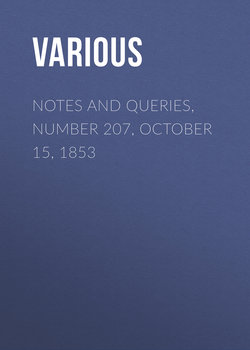Читать книгу Notes and Queries, Number 207, October 15, 1853 - Various - Страница 3
Notes
THE OLD ENGLISH WORD "BELIKE."
ОглавлениеThe word belike, much used by old writers, but now almost obsolete, even among the poor, seems to have been but very imperfectly understood—as far as regards its original meaning and derivation. Most persons understand it to be equivalent, or nearly so, to very likely, in all likelihood, perhaps, or, ironically, forsooth; and in that opinion they are not far wrong. It occurs in this sense in numerous passages in Shakspeare; for instance:
"Some merry mocking lord, belike."—Love's Labour's Lost.
"O then, belike, she was old and gentle."—Henry V.
"Belike, this show imports the argument."—Hamlet.
Such also was Johnson's opinion of the word, for he represents it to be "from like, as by likelihood;" and assigns to it the meanings of "probably, likely, perhaps." However, I venture to say, in opposition to so great an authority, that there is no immediate connexion whatever between the words belike and likely, with the exception of the accidental similarity in the syllable like.
We find three different meanings attached to the same form like in English, viz. like, similis; to like, i. e. to be pleased with; and the present word belike, whose real meaning I propose to explain.
The first is from the A.-S. lic, gelic; Low Germ. lick; Dutch gelyk; Dan. lig (which is said to take its meaning from lic, a corpse, i. e. an essence), which word also forms our English termination -ly, sometimes preserving its old form like; as manly or manlike, Godly or Godlike; A.-S. werlic, Godlic; to which the Teut. adjectival termination lich is analogous.
The second form, to like, i. e. to be pleased with, is quite distinct from the former (though it has been thought akin to it on the ground that simili similis placet); and is derived from the A.-S. lician, which is from lic, or lac, a gift; Low Germ. licon; Dutch lyken.
The third form, the compound term belike (mostly used adverbially) is from the A.-S. licgan, belicgan, which means, to lie by, near, or around; to attend, accompany; Low Germ. and Dutch, liggen; Germ. liegen. In the old German, we have licken, ligin, liggen—jacere; and geliggen—se habere; which last seems to be the exact counterpart of our old English belike; and this it was which first suggested to me what I conceive to be its true meaning. We find the simple and compound words in juxtaposition in Otfridi Evang., lib. i. cap. 23. 110. in vol. i. p. 221. of Schilter's Thes. Teut.:
"Thoh er nu biliban si,
Farames thoh thar er si
Zi thiu'z nu sar giligge,
Thoh er bigraben ligge."
"Etsi vero is (Lazarus) jam mortuus est,
Eamus tamen ubi is sit,
Quomodo id jam se habeat (quo in statu sint res ejus),
Etiamsi jam sepultus jaceat."
On which Schilter remarks:
"Zi thiu'z nu sar giligge quomodo se res habeat, hodie standi verbo utimur,—wie es stehe, zustehe."
We thus see that the radical meaning of the word belike is to lie or be near, to attend; from which it came to express the simple condition, or state of a thing: and it is in this latter sense that the word is used as an adverbial or rather an interjectional expression, when it may be rendered, it may be so, so it is, is it so, &c. Sometimes ironically, sometimes expressing chance, &c.; in the course of time it became superseded by the more modern term perhaps. Instances of similar elliptical expressions are common at the present day, and will readily suggest themselves: the modern please, used for entreaty, is analogous.
It is not a little singular that this account of the word belike enables us to understand a passage in Macbeth, which has been unintelligible to all the commentators and readers of Shakspeare down to the present day. I allude to the following, which stands in my first folio, Act IV. Sc. 3., thus:
" . . . . What I am truly
Is thine, and my poor countries, to command:
Whither indeed before they heere approach,
Old Seyward, with ten thousand warlike men,
Already at a point, was setting foorth:
Now we'll together, and the chance of goodnesse
Be like our warranted quarrel."
Now it is not easy to see why Malcolm should wish that "chance" should "be like," i. e. similar to, their "warranted quarrel;" inasmuch as that quarrel was most unfortunate and disastrous. Chance is either fortunate or unfortunate. The epithet just, which might apply to the quarrel in question, is utterly irreconcilable with chance. Still this sense has pleased the editors, and they have made "of goodnesse" a precatory and interjectional expression. Surely it is far more probable that the poet wrote belike (belicgan, geliggen) as one word, and that the meaning of the passage is simply "May good fortune attend our enterprise." Mr. Collier's old corrector passes over this difficulty in silence, doubtless owing to the circumstance that the word was well understood in his time.
I have alluded to the word like as expressive in the English language of three distinct ideas, and in the A.-S. of at least four; is it not possible that these meanings, which, as we find the words used, are undoubtedly widely distinct, having travelled to us by separate channels, may nevertheless have had originally one and the same source? I should be glad to elicit the opinion of some one of your more learned correspondents as to whether the unused Hebrew ילן may not be that source.
H. C. K.
—– Rectory, Hereford.
